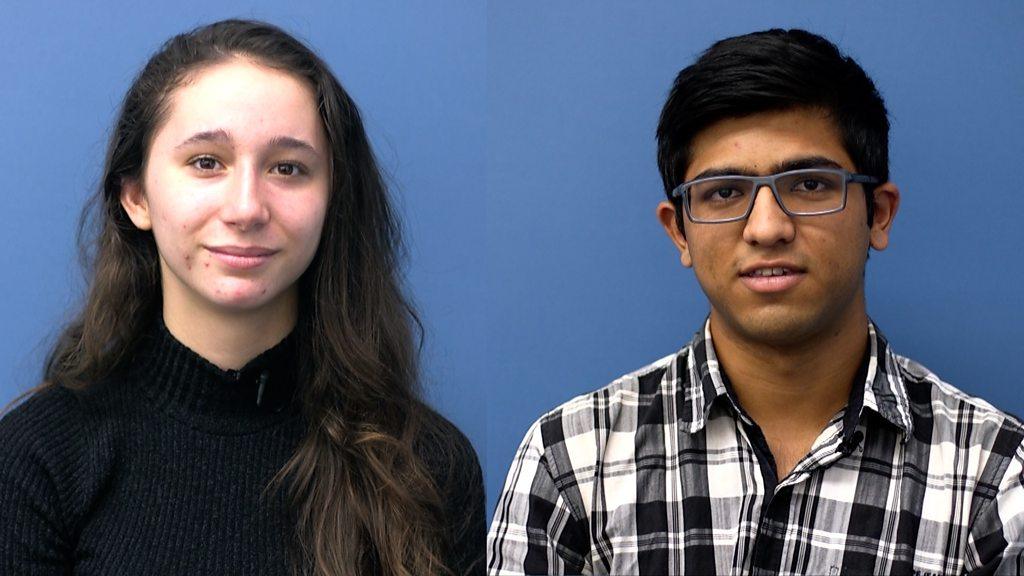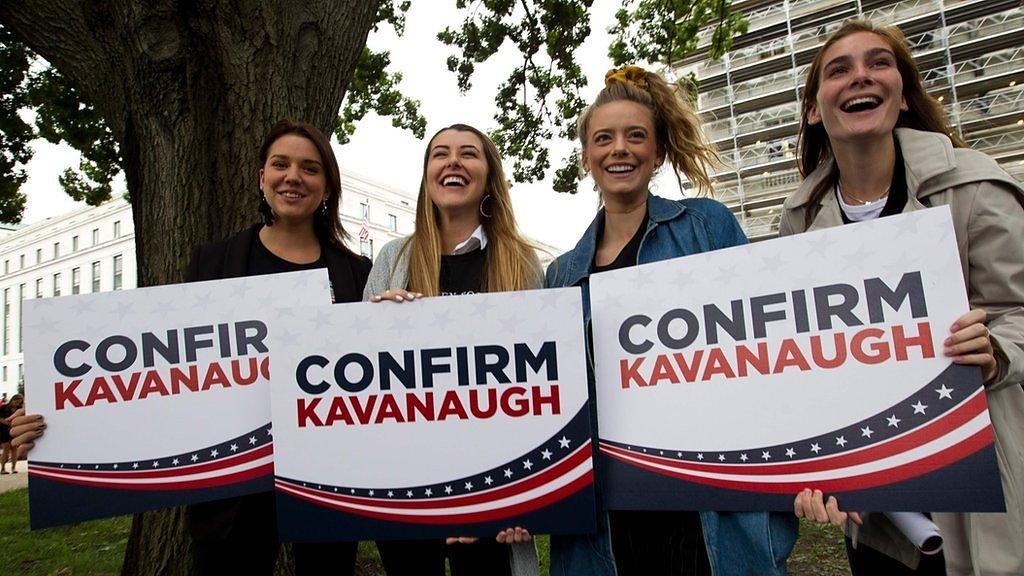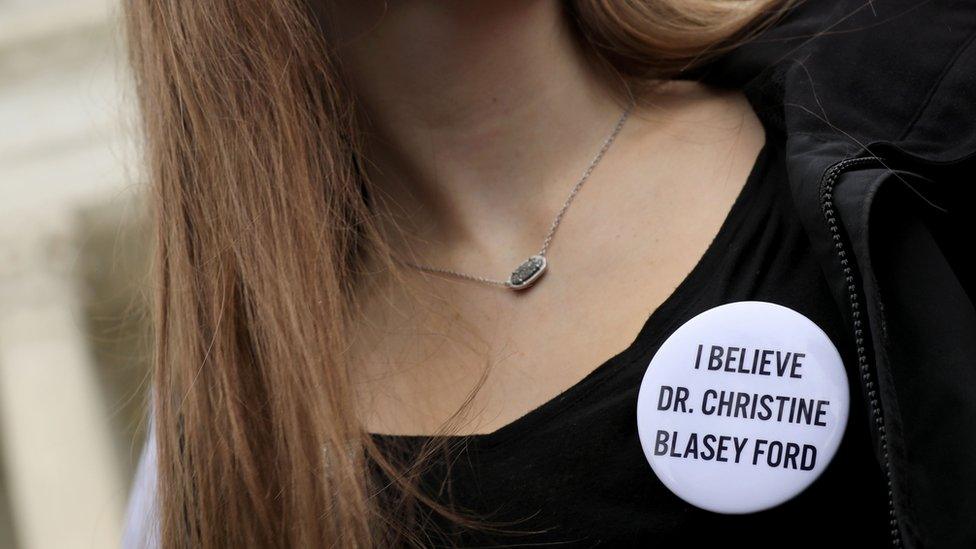Trump: 'Scary and difficult time for young men' in US
- Published
Trump: "Somebody could accuse you of something and you're automatically guilty."
President Donald Trump has told reporters it is a "difficult" and "scary" time for young men in the US.
Mr Trump's remarks came as he reiterated his support for Supreme Court nominee Brett Kavanaugh, who is battling sexual misconduct claims by several women.
A vote to confirm Judge Kavanaugh has been delayed as the FBI investigates the claims, which he denies.
Mr Trump said he believed the Senate would approve the judge.
His appointment would be expected to tilt America's top court in favour of conservatives for years to come.
What did President Trump say?
Speaking to reporters at the White House on Tuesday, Mr Trump said: "My whole life I've heard, 'you're innocent until proven guilty', but now you're guilty until proven innocent. That's a very, very difficult standard.
"It's a very scary time for young men in America when you can be guilty of something that you may not be guilty of."
The president said he was waiting to see what would come out of the FBI investigation into his top court pick, and he did not want to "interrupt" anything.
At a rally later in Southaven, Mississippi, Mr Trump mocked last week's Senate testimony by Prof Christine Blasey Ford, without mentioning her by name.
She says Judge Kavanaugh, 53, assaulted her when they were teenagers.
How US teens talk about sexual assault
The audience laughed as the president said: "Thirty-six years ago this happened: I had one beer! Well, you think it was…? Nope! It was one beer.
"Oh, good. How'd you get home? I don't remember. How'd you get there? I don't remember. Where was the place? I don't remember.
"How many years ago was it? I don't know. I don't know. I don't know! I don't know! What neighbourhood was it in? I don't know.
"Where's the house? I don't know! Upstairs, downstairs, where was it? I don't know! But I had one beer. That's the only thing I remember. And a man's life is in tatters."
Mr Trump then criticised those who he accused of manipulating the accusers for political reasons.
"They want to destroy people," he said. "These are really evil people."
The crowd chanted: "We want Kavanaugh! We want Kavanaugh!"

Court of public opinion
Analysis by Anthony Zurcher, BBC North America correspondent
The president has come to the defence of young (presumably white, presumably privileged) men, innocent or guilty, who suddenly find their reputations and livelihood threatened a year after the #MeToo whirlwind first swept on to the scene.
In a nation where young black men are incarcerated at a rate five times, external those of their white counterparts, the concept of "innocent until proven guilty" in criminal proceedings may ring hollow. For the rest of the nation, however - particularly the wealthy and well-connected - it has been central to the American concept of justice and due process.
Those guarantees are proving to be scant protection now, however, when it's the court of public opinion, the court of the mass media, the court of American culture at large that are rendering their verdicts.
Judge Kavanaugh's critics have been quick to point out that his nomination process is more akin to a job interview, where the worst that can happen is he doesn't get a promotion to the most powerful court in the nation.
But is it just a promotion at play? Judge Kavanaugh's defenders counter that the accusations against him risk making the man a professional and social pariah. He has been disavowed by students and faculty of his alma mater, and his Harvard Law School teaching job has been terminated. If his nomination fails, he may still be a judge - but he will be always be the accused judge.
The court of public opinion may not send people to prison, but - as the president notes - its verdicts come with their own sharp bite.
What's latest with FBI investigation?
Senate Majority Leader Mitch McConnell said on Tuesday only senators will see the FBI's report on its investigation.
Mr Trump and his fellow Republicans want the FBI inquiry over this week.
Meanwhile, a lawyer for Prof Ford said they had yet to be contacted by investigators, five days after the inquiry was launched.
"It's inconceivable that the FBI could conduct a thorough investigation of Dr Ford's allegations without interviewing her," her legal team wrote in a letter to FBI Director Christopher Wray.
Republicans accuse Democrats of seeking to delay a vote until after the mid-term elections, in the hope they will win control of Congress and derail Judge Kavanaugh's appointment.
But Democrats say they should not be rushed into a vote and the FBI should be allowed more time to investigate all allegations against the nominee.
What's the political reaction?
Top judiciary committee Democrat Dianne Feinstein said Friday would be too soon to vote on the nomination, as Republicans are thought to be planning.
Senator Lindsey Graham, a South Carolina Republican who has fiercely championed the nominee, said the president should put Judge Kavanaugh forward again if the Senate fails to confirm him.
Senator Jeff Flake, an Arizona Republican who helped spur the FBI inquiry, criticised the judge for "sharp and partisan" remarks in his own Senate testimony last week.
"That concerns me," Mr Flake said at an event in Washington on Tuesday. "We can't have this on the court."
It is not clear how Mr Flake will vote, but Republicans narrowly control the Senate by 51-49 and can only afford one defection.
In his recent testimony, Judge Kavanaugh portrayed the allegations against him as a smear plot "on behalf of the Clintons".
Appearing at the same event as Mr Flake on Tuesday, Hillary Clinton scorned the nominee's claim.
"I mean, really," she said. "Yes, it deserves a lot of laughter."

Who are the accusers?
Judge Kavanaugh denies the claims of three women:
Psychology lecturer Prof Christine Blasey Ford, the first woman to come forward, says he tried to remove her clothing, pinned her to a bed and covered her mouth at a house party in 1982, when she was 15 and he was 17
Deborah Ramirez, a student at Yale at the same time as him, says he exposed himself to her during a college drinking game
Julie Swetnick says she went to house parties attended by him in the early 1980s, where she said he and his friends had tried to "spike" girls' drinks

- Published1 October 2018

- Published27 September 2018

- Published26 September 2018
